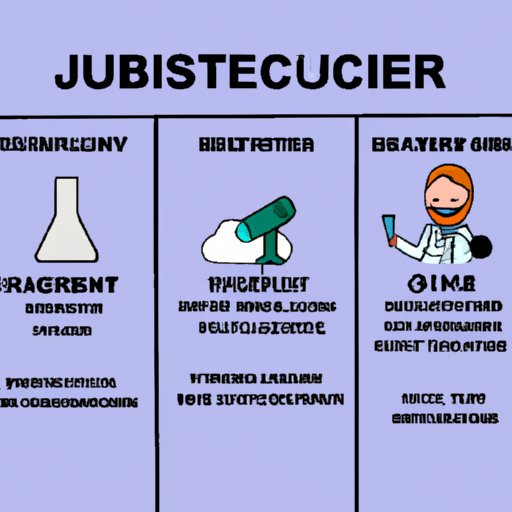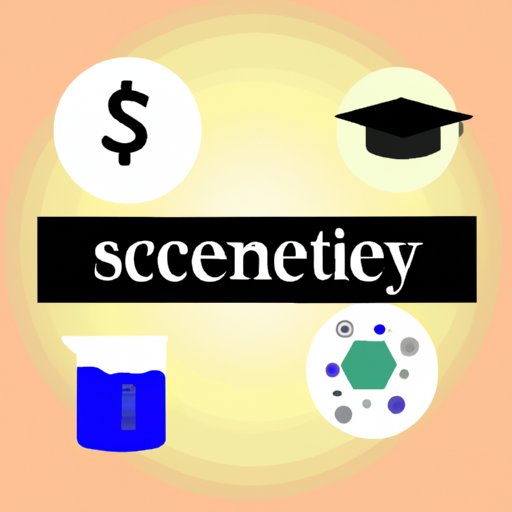Introduction
Science is an ever-evolving field that encompasses a wide range of disciplines, from physics and chemistry to biology and psychology. It is a powerful tool for understanding the world around us and has led to numerous advances in technology, medicine, and other areas. As such, it provides a wealth of job opportunities for those interested in pursuing a career in science.
In this article, we will explore the different types of jobs science can get you and the benefits of pursuing a career in science. We will also highlight successful science professionals and their careers, examine the skills needed for science-related jobs, investigate the salary level of science-based occupations, and analyze the job outlook for science professionals.

Exploring the Different Types of Jobs Science Can Lead To
Science can lead to a variety of job opportunities across numerous fields. Depending on your interests, you may find yourself working in the natural sciences, the social sciences, or technology and engineering.
Careers in the Natural Sciences
The natural sciences are a broad field that encompasses many disciplines, including biology, chemistry, geology, and physics. Within this field, there are a variety of jobs, including research scientists, environmental scientists, and medical scientists. Research scientists conduct experiments and analyze data in order to better understand the natural world. Environmental scientists study the effects of human activity on the environment and work to protect it. Medical scientists focus on researching diseases and developing treatments.
Careers in the Social Sciences
The social sciences are another broad field that includes anthropology, economics, political science, and sociology. Careers in this field often involve analyzing data, conducting surveys, and studying human behavior. Examples of social science-related jobs include market researchers, urban planners, and sociologists.
Careers in Technology and Engineering
Technology and engineering are two closely related fields that draw heavily on scientific principles. Careers in these fields involve designing and building products and systems, as well as developing new technologies. Examples of jobs in these fields include software engineers, biomedical engineers, and aerospace engineers.

Highlighting the Benefits of a Career in Science
A career in science can provide a number of benefits. According to a survey conducted by the American Association for the Advancement of Science (AAAS), scientists report higher levels of job satisfaction than non-scientists. The survey also found that scientists felt their work was intellectually challenging and allowed for creative problem solving.
In addition to the intellectual rewards of a career in science, it also offers job security. According to the AAAS survey, the majority of scientists reported feeling secure in their positions. This is due to the fact that many scientific fields are experiencing rapid growth and have a high demand for qualified professionals. Furthermore, science-related jobs often offer competitive salaries, with some fields offering salaries far above the national average.
Showcasing Successful Science Professionals and Their Careers
To demonstrate the potential of a career in science, let’s take a look at some of the most notable scientists and their accomplishments. Marie Curie is widely regarded as one of the most influential scientists of all time. She made major contributions to the fields of physics and chemistry, discovering two elements and winning two Nobel Prizes. Stephen Hawking was a theoretical physicist who wrote several groundbreaking books on cosmology and black holes. His work helped redefine our understanding of the universe.
We can also look at the career paths of current science professionals to get an idea of what a career in science might look like. Many scientists start out by obtaining a bachelor’s degree in a scientific field before moving on to graduate school. From there, they may go on to pursue a research position in academia or industry. Alternatively, they may choose to pursue a more specialized career, such as a technology engineer or medical scientist.
Examining the Skills Needed for Science-Related Jobs
Science-related jobs require a wide range of skills in order to be successful. Critical thinking is essential for making informed decisions and evaluating data. Analytical reasoning is necessary for understanding complex concepts and drawing logical conclusions. Research skills are important for staying up-to-date on the latest developments in your field. And finally, technical proficiencies are necessary for working with various tools and technologies.
In addition to these skills, science-related jobs also require strong communication and interpersonal skills. Scientists must be able to effectively collaborate with colleagues and communicate their findings to others.
Investigating the Salary Level of Science-Based Occupations
According to the Bureau of Labor Statistics, the average salary for science-related occupations is $80,000 per year. However, salary levels can vary greatly depending on the field and the individual’s experience and qualifications. For example, medical scientists tend to make more than environmental scientists, while software engineers tend to make more than electrical engineers.
In addition to the field, salary levels can also be affected by the location of the job. For example, scientists in the San Francisco Bay Area tend to make more than those in other parts of the country due to the high cost of living in the area.

Analyzing the Job Outlook for Science Professionals
The demand for science-related occupations is expected to remain strong in the coming years. According to the Bureau of Labor Statistics, occupations in the natural sciences are projected to grow by 8%, while occupations in the social sciences are projected to grow by 6%. Similarly, occupations in technology and engineering are expected to grow by 7% over the next decade.
However, the impact of automation on job prospects is a cause for concern. Automation is expected to reduce the demand for certain science-related jobs, such as data entry and manufacturing. On the other hand, it is expected to create demand for new jobs, such as software developers and computer system analysts.
Conclusion
Science is a powerful tool that can lead to a wide range of exciting job opportunities. From the natural sciences to technology and engineering, there is a wealth of possibilities for those interested in pursuing a career in science. A career in science provides intellectual challenge, opportunities for creative problem solving, and job security. In addition, science-related jobs often come with competitive salaries and a positive job outlook.
In order to succeed in a science-related job, you need to possess a set of specific skills, such as critical thinking, analytical reasoning, research skills, and technical proficiencies. Additionally, strong communication and interpersonal skills are essential for collaborating with colleagues and communicating your findings to others. With the right skills and knowledge, a career in science can be both rewarding and lucrative.
For further information about careers in science, please visit the American Association for the Advancement of Science website (https://www.aaas.org/careercenter).
(Note: Is this article not meeting your expectations? Do you have knowledge or insights to share? Unlock new opportunities and expand your reach by joining our authors team. Click Registration to join us and share your expertise with our readers.)
